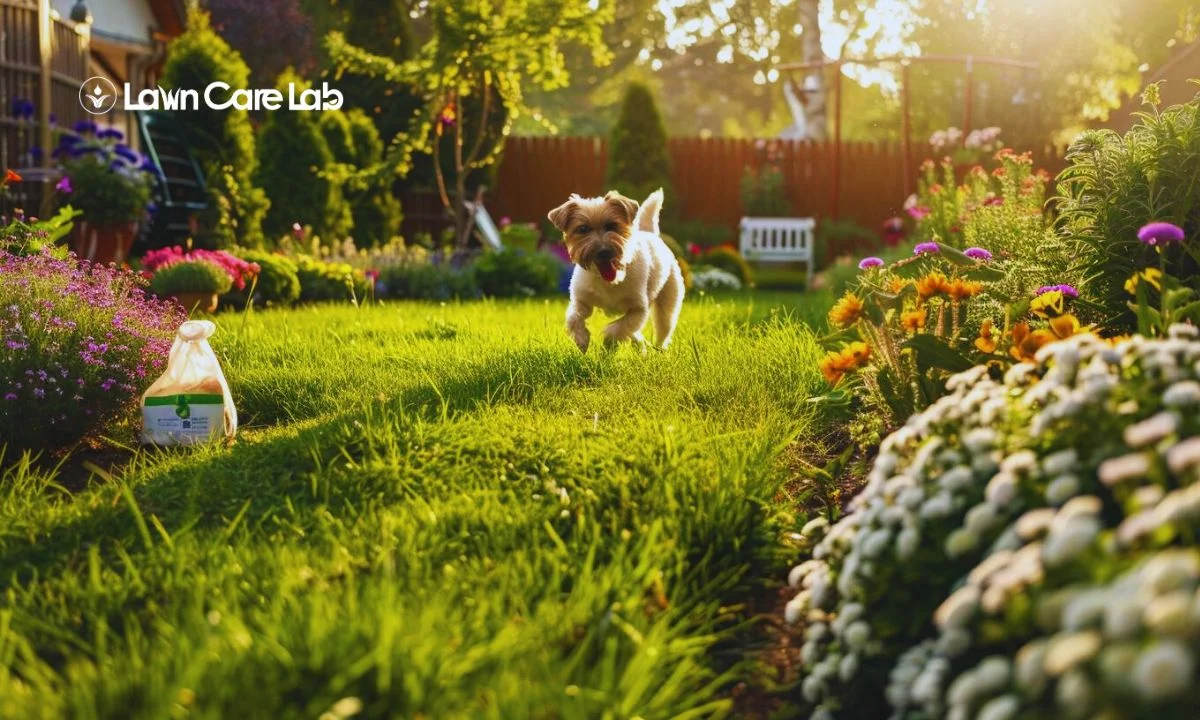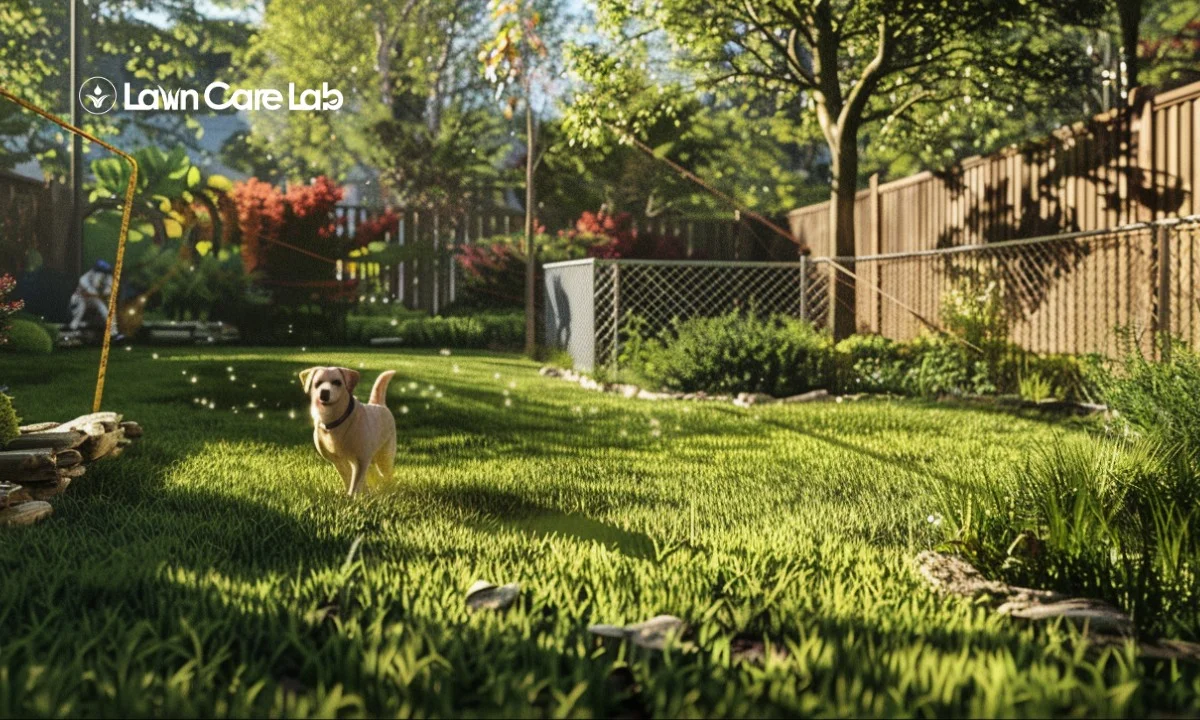When planning your garden care, it’s crucial to consider the safety of your dogs. Gardening with dog-friendly weed and feed products helps avoid harmful chemicals that could damage more than weeds. These products protect your pets and support a healthy garden environment.
Are these natural alternatives as effective at promoting strong plant growth and controlling pests as chemical ones? In this article, we will discuss whether these products truly balance effectiveness with safety.
Table of Contents
Pet-Safe Lawn Care
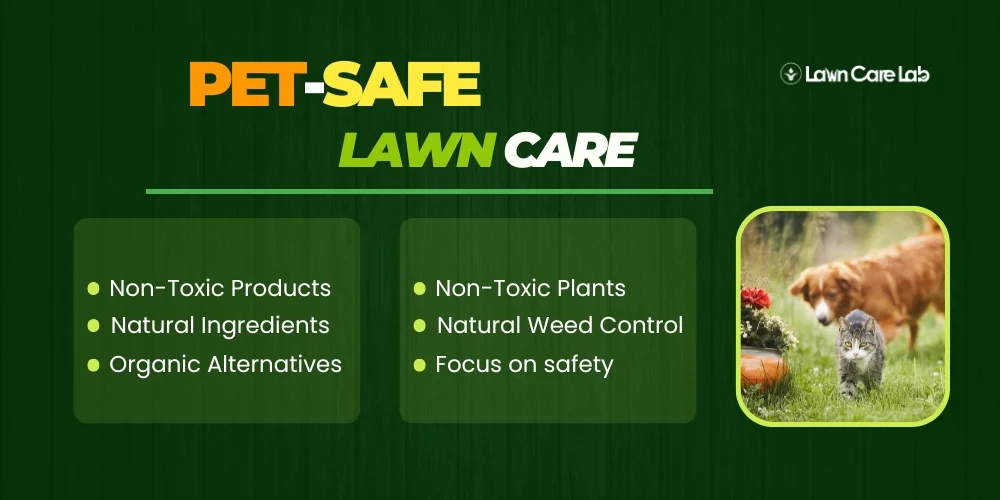
When selecting lawn care products, prioritize those labeled as non-toxic and safe for pets to protect both your lawn and your animals.
Choose weed killers and fertilizers that contain natural, pet-safe ingredients like pre-emergent herbicides derived from organic sources.
Key Differences
Opt for organic or pet-friendly alternatives to chemical-based products to minimize risks of poisoning and environmental damage. These organic choices enhance soil health by boosting microbial activity, which in turn strengthens plant roots.
Additionally, selecting non-toxic plants is crucial for pet safety, particularly for pets that may chew on garden foliage. Embrace pet-safe gardening practices that focus on both safety and environmental sustainability.
Consider using natural weed control methods like vinegar solutions or corn gluten meal, which are safe for pets. Brands such as Espoma offer effective organic lawn care products that ensure your garden remains both beautiful and safe for pets. Adopting these methods helps create a healthy, pet-friendly garden environment.
Choosing the Right Dog-Friendly Weed Killers
When selecting weed killers that are safe for dogs, prioritize
crafted from natural and quickly decomposable ingredients. These formulations break down swiftly, greatly reducing the risk of exposing your dog to harmful chemicals. Opt for weed killers that are free from harsh chemicals and feature non-toxic, natural ingredients that ensure your pet’s safety while maintaining a healthy lawn.
Recommended Pet-Friendly Brands
Here are some top Safe Weed Killers for Dogs:
- EcoSmart: Utilizes plant-based oils to target weeds without the use of dangerous chemicals effectively.
- Doctor Kirchner Natural Weed Killer: Offers a blend of ocean saltwater, vinegar, and soap, all of which are safe for pets and the environment.
- Green Gobbler: Known for its vinegar-based weed killers, Green Gobbler provides an effective solution that is also pet-friendly.
Features of Safe Weed-Killing Products
Select products that are easy to use and leave no harmful residues. This consideration helps maintain a safe environment for your dog to enjoy outdoor activities without the threat of chemical exposure.
Here’s a simple breakdown of what makes each product unique:
- Burnout Fast Acting Weed & Grass Killer: Features clove oil, known for its quick and effective weed-killing action.
- Doctor Kirchner Natural Weed Killer: Leverages the natural potency of ocean saltwater.
- Green Gobbler Vinegar Weed Killer: Employs vinegar for its strong weed-killing properties, ensuring safety for pets.
By choosing these safer alternatives, you not only protect your dog but also contribute to a healthier ecosystem around your home.
Selecting the Best Pet-Friendly Lawn Fertilizers
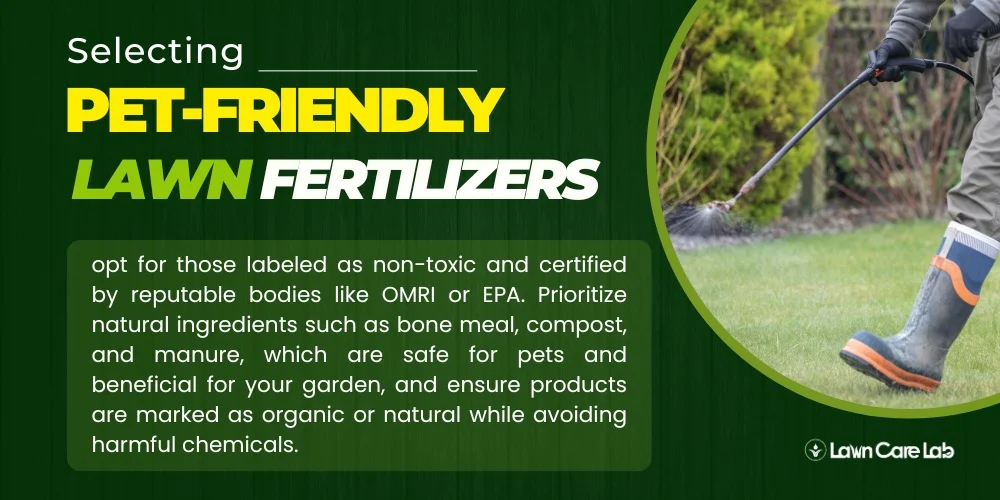
When choosing the safest lawn fertilizers for pets, focus on products with natural or organic ingredients. These ingredients are less likely to harm your pets if they come into contact with the treated lawn.
Always verify that the fertilizer is labeled as non-toxic and look for certifications like OMRI (Organic Materials Review Institute) listed or EPA-approved. These certifications are essential indicators of the product’s safety for both your pets and the environment.
Essential Components
When choosing safe lawn fertilizers for pets, look for natural and organic options like bone meal, compost, and manure. These ingredients are safe for pets and also benefit your garden:
- Bone Meal: High in phosphorus, it aids plant energy management.
- Compost: Offers a rich mix of nutrients and improves soil structure.
- Manure: Increases nitrogen levels, essential for leaf growth.
These components not only ensure the safety of your pets but also enhance the overall health of your garden.
Buying Tips
Before purchasing, confirm that the fertilizers are marked as organic or natural.
Avoid products containing harmful chemicals like disulfoton or metaldehyde.
Instead, choose fertilizers that use plant-based materials and explicitly state they are pet-friendly.
This careful selection process will protect your pets and ensure your lawn remains lush and vibrant.
Choosing Pet-Friendly Plants
When planning your garden, it’s essential to select plants that are safe for pets, as some common varieties like lilies and sago palms pose serious health risks to animals.
Opt for pet-friendly plants such as catnip or snapdragons, which not only ensure the safety of your pets but also contribute to a toxin-free garden environment. This selection allows your pets to enjoy the garden safely and creates a beautiful, harmonious space for everyone.
Toxic Plants to Avoid
Be vigilant in avoiding plants known to be harmful to pets. Key examples include:
- Lilies: Extremely toxic to cats, potentially causing kidney failure.
- Azaleas: Contain grayanotoxins that can disrupt muscular function and cardiovascular stability.
- Oleander: Highly toxic and can cause severe vomiting, heart issues, and possibly death.
- Sago Palm: Contains cycasin, which is extremely toxic to pets if ingested.
- Tulips: The bulbs are particularly toxic to dogs, potentially causing nausea, heart issues, and convulsions.
Always research and consult comprehensive resources to make informed choices about the plants in your garden to keep your pets safe.
Safe Alternatives for Your Garden
For a pet-safe and environmentally friendly garden, consider adding:
- Spider Plant: An air-purifying, low-maintenance plant that thrives in low light.
- Boston Fern: Requires regular watering and enjoys high humidity, featuring lush green leaves.
- Bamboo Palm: Known for its ability to remove toxins and its preference for low sunlight.
- African Violet: Safe for pets and adds a splash of color with its vibrant flowers.
- Areca Palm: Known for its soft fronds and non-toxic nature.
These pet-friendly plants add to the beauty of your garden while keeping it safe for your furry friends and maintaining a balanced ecosystem.
Application Tips for Pet Safety
When using weed and feed products in your garden, ensure your pets’ safety by strictly adhering to the manufacturer’s instructions.
Use the exact recommended amount and apply it as directed to minimize your pets’ exposure to harmful chemicals. Keep pets away from treated areas until the chemicals have fully settled into the ground, following the specified waiting period in the product instructions.
This careful approach helps protect your pets while maintaining your garden.
Best Practices
To keep your pet safe when using lawn care products, it’s essential to apply them carefully.
- Wait Times: Keep pets indoors until the product has completely dried or absorbed. Check the lawn thoroughly for any residues before allowing pets back outside. Drying times can vary, so adhere strictly to the timelines suggested on the product label.
- Secure Storage: Always store lawn care products in a locked cabinet or on a high shelf to prevent pets from accessing them.
Opting for pet-friendly products like EcoSMART Organic Insect Killer can safeguard your pets while also protecting the environment. These products are designed to be safe for use around pets and provide an effective solution to pest issues without harmful side effects.
Safe Application Techniques
When using dog-friendly weed and feed products, it’s important to apply them carefully to keep your pets safe. Treat areas your pets usually avoid to prevent them from accidentally swallowing or touching the product while they play or explore outside.
- Strategic Treatment: Apply products in areas less frequented by your pets. This helps prevent accidental contact while they play or explore.
- Application Timing: Treat your lawn early in the morning when the dew can help granules adhere to the soil, reducing the chance of them becoming airborne or attaching to your pet’s fur.
- Follow Guidelines: Always adhere to the manufacturer’s guidelines regarding application timing and dosage to ensure effectiveness and safety.
Natural Alternatives to Chemicals
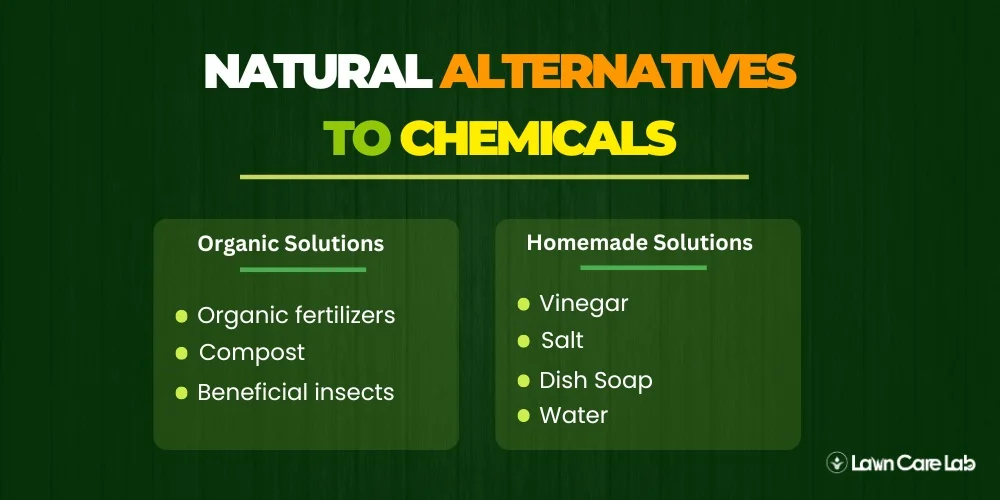
When gardening with your dog in mind, opting for organic materials such as compost or manure can enrich the soil safely and effectively.
These natural fertilizers are not only dog-friendly but also enhance soil health without the risks associated with chemical treatments.
Organic Solutions
Consider organic approaches for maintaining your lawn, such as using organic fertilizers, embracing composting, and introducing beneficial insects like ladybugs and lacewings.
Organic fertilizers release nutrients slowly, mimicking natural soil processes, which encourages the growth of strong plants and roots.
Composting converts kitchen and yard waste into nutrient-rich soil that improves water retention and aeration, benefiting plant health.
Beneficial insects naturally manage pest populations, reducing the need for harmful chemical pesticides and promoting a safer environment for your pets and the ecosystem.
Using organic fertilizers like Espoma Organic All-Purpose Fertilizer and a compost bin can enhance your garden’s health and sustainability, creating a thriving and pet-friendly environment.
Homemade Solutions
For weed control, a simple homemade solution using vinegar, salt, dish soap, and water can be an effective alternative to synthetic herbicides.
Here’s how to make and use this pet-safe weed killer:
- Vinegar: Lowers pH levels, causing weed leaves to lose water.
- Salt: Disrupts water absorption by weeds, effectively dehydrating them.
- Dish Soap: Helps the solution adhere to the weeds for more effective action.
- Water: Dilutes the mixture to prevent it from being too harsh and ensures even distribution.
Test the weed-killing solution on a small area before using it widely. Apply only to weeds to avoid harming other plants.
Conclusion
To ensure your lawn remains beautiful and safe for your pets, opt for lawn care products specifically formulated to be pet-friendly. Instead of traditional weed killers and fertilizers, choose those made from natural and organic ingredients, such as corn gluten meal, which is non-toxic to pets.
This approach safeguards your pets’ health while keeping your lawn lush and attractive.
- How to Create a Lawn Care Schedule for Southern Climates - October 30, 2024
- How to Use Compost Tea to Boost Lawn Growth and Soil Health - October 23, 2024
- The Best Grasses for Saltwater-Exposed Lawns: Coastal Lawn Care - October 17, 2024

